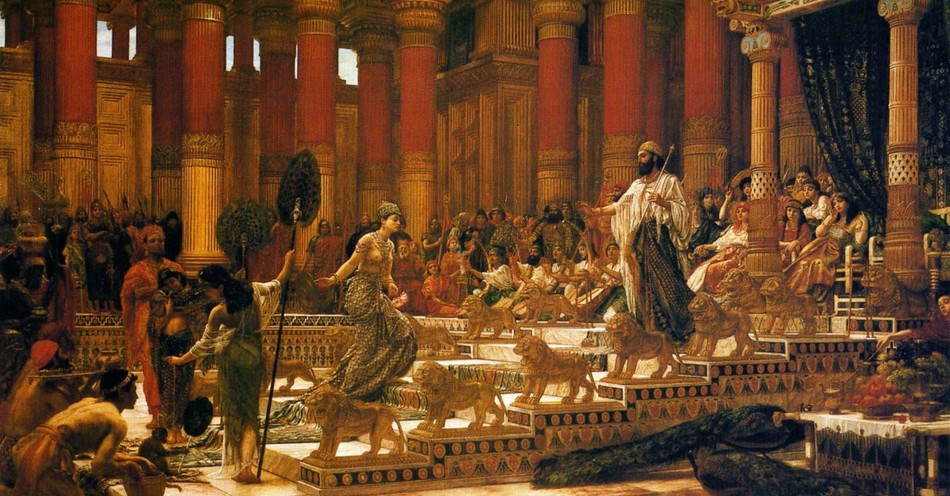King Solomon authored multiple books in the Old Testament, ruled over Israel, and is known for his wisdom from the Lord. How did he come to power and why was he blessed with such notable discernment? Learn about the life, lessons, and legacy of King Solomon.
King Solomon: Table of Contents
- Who Was King Solomon?
- Famous Bible Quotes
- What Was King Solomon Known For?
- How Old Was King Solomon When He Became King?
- King Solomon's Wives
- King Solomon's Temple
- Son of David
- King Solomon's Wealth
- King Solomon's Ring
- Queen of Sheba
- Proverbs, Ecclesiastes, & Song of Solomon
- King Solomon's Mistakes
- King Solomon in the Bible
Who Was King Solomon?
Solomon was the third and final king of the unified nation of Israel, succeeding King Saul and King David. He was the son of David and Bathsheba, the former wife of Uriah the Hittite whom David had killed to cover his infidelity with Bathsheba while her husband was on the battlefront. Solomon wrote the Song of Solomon, the book of Ecclesiastes, and much of the book of Proverbs. His writing of Ecclesiastes is disputed by some, but Solomon is the only “son of David” to be “king over Israel in Jerusalem” (Ecclesiastes 1:1-12), and many of the descriptions of the author fit Solomon well. Solomon ruled for 40 years (1 Kings 11:42).
Famous Bible Quotes from King Solomon
"Trust in the Lord with all your heart, and do not lean on your own understanding." ~ Proverbs 3:5
"Iron sharpens iron, and one man sharpens another." ~ Proverbs 27:17
"The way of a fool is right in his own eyes, but a wise man listens to advice." ~ Proverbs 12:15
"The fear of the Lord is the beginning of knowledge; fools despise wisdom and instruction." ~ Proverbs 1:7
"Open your mouth, judge righteously, defend the rights of the poor and needy." ~ Proverbs 31:9
What Was King Solomon Known For?
King Solomon is still celebrated for his exceptional wisdom. When Solomon rose to the throne, he sought after God, and God allowed him to request whatever he desired. Solomon humbly recognized his inability to rule well and nobly asked God for the wisdom he would need to govern God’s people righteously.
King Solomon's wisdom is a central theme in the Bible, highlighted by the famous judgment involving two women who come to King Solomon, both claiming to be the mother of the same baby. They live in the same house, and each gave birth to a son within days of each other. However, one of the infants dies, and both women assert that the living child is hers.
The two women present their case before Solomon. Their conflicting claims create a dilemma, and Solomon is faced with the task of discerning the true mother. In a moment of brilliant wisdom, Solomon proposes a solution to determine the genuine mother. He suggests cutting the living baby in two and giving each woman half. The real mother, in her love and compassion, immediately offers to give up her claim to save the child's life. The other woman, without hesitation, agrees to Solomon's proposal.
Solomon, perceiving the genuine mother's love and selflessness, intervenes decisively. He declares that the living child should be given to the woman who pleaded for his life, recognizing her as the true mother. The people witness Solomon's divine wisdom and are in awe of his ability to discern the truth in a challenging situation. The story, found in 1 Kings 3:16-28, demonstrates Solomon's discernment and practical wisdom. His proposal to divide the child aimed not only to expose the true mother but also showcased Solomon's deep understanding of human nature and justice.
How Old Was Solomon When He Became King?
The age at which King Solomon ascended to the throne is not explicitly mentioned. However, it is established that Solomon succeeded his father, King David, as king of Israel. According to 1 Kings 2:10-12, David reigned over Israel for 40 years, and Solomon took the throne after his father's death. Consequently, it is estimated that Solomon was relatively young when he became king, likely in his late teens or early twenties.
Solomon's youthfulness becomes significant when considering his personal choices, particularly in matters of marriage and alliances with foreign nations. Solomon's lack of seasoned discernment might have influenced his decisions to form alliances through marriages, ultimately leading to spiritual compromise.
King Solomon's Wives
Unfortunately, Solomon's private life was marked by a departure from God's commands, particularly in the realm of relationships. Despite God's explicit instructions against marrying foreign wives who might lead him astray, Solomon married many foreign women, including Pharaoh's daughter (1 Kings 3:1, 1 Kings 11:1). These marriages were not merely for diplomatic reasons but were often motivated by political alliances. Solomon accumulated a vast harem, with 700 wives and 300 concubines, a departure from God's design for marriage as outlined in Genesis.
"King Solomon, however, loved many foreign women besides Pharaoh’s daughter—Moabites, Ammonites, Edomites, Sidonians and Hittites. They were from nations about which the Lord had told the Israelites, 'You must not intermarry with them, because they will surely turn your hearts after their gods.' Nevertheless, Solomon held fast to them in love. He had seven hundred wives of royal birth and three hundred concubines, and his wives led him astray. As Solomon grew old, his wives turned his heart after other gods, and his heart was not fully devoted to the Lord his God, as the heart of David his father had been." (1 Kings 11:1-4)
This passage highlights the fact that Solomon's accumulation of many wives, including both those of royal birth and concubines, was contrary to God's command. The Deuteronomic law explicitly warned against intermarriage with foreign nations that worshipped other gods, as it could lead the Israelites away from their devotion to the one true God (Deuteronomy 7:3-4). In Solomon's case, the influence of his foreign wives indeed led him to worship foreign gods, compromising his devotion to the God of Israel. 1 Kings 11 reveals that Solomon's heart turned away from God, leading to his involvement in idolatry, a grievous sin in the eyes of the Lord.
While the Bible acknowledges Solomon's unparalleled wisdom, it also underscores the consequences of his disobedience. God became angry with Solomon and declared that the kingdom would be torn away from his descendants. The story of Solomon serves as a cautionary tale about the potential dangers of compromising one's faith and commitment to God for the sake of worldly desires. It reinforces the importance of adhering to God's principles in all aspects of life, including relationships and marriage, to maintain spiritual fidelity and avoid the pitfalls of disobedience.
King Solomon's Temple
Solomon's most substantial endeavor was the construction of the First Temple in Jerusalem. This grand project, initiated around 967 BCE, marked a crucial transition in Israel's religious practices. The construction process and the eventual dedication of the Temple are detailed in 1 Kings 6-7. The Temple became the focal point for worship, housing the Ark of the Covenant. Prior to the construction of the Temple, the Ark of the Covenant was housed in a portable tabernacle. The establishment of a permanent structure in Jerusalem consolidated the religious practices of the Israelites and served as a unifying force for the twelve tribes of Israel. Jerusalem became the spiritual and political center of the nation. The Temple marked a shift from the nomadic worship associated with the tabernacle to a fixed, permanent location. This transition reflected the stability and permanence of the Davidic monarchy and the consolidation of religious practices in a centralized place. The construction of the Temple fulfilled the Davidic Covenant (2 Samuel 7:12-16).
Son of David
King Solomon's reign was noteworthy not only because of his actions but his position on the throne continuing the line of King David in ruling Israel. David was celebrated for his victory over Goliath and his role in establishing Jerusalem as the capital, laid the foundation for a powerful dynasty. David made a covenant with God, expressing his desire to build a "house" or temple for the Ark of the Covenant. God responded by making a covenant with David, promising that his descendants would rule over Israel perpetually. This is the Davidic Covenant (2 Samuel 7:12-16), and Solomon, as David's son, is the fulfillment of this divine promise. Solomon's accession to the throne marked the culmination of this lineage, signifying a continuation of the legacy of Israel's greatest kings.
King Solomon's Wealth
The reign of King Solomon is often associated with unparalleled prosperity. In fact, "King Solomon was greater in riches and wisdom than all the other kings of the earth" (1 Kings 10:23). His wise governance, successful trade ventures, and alliances contributed to the economic strength of the Kingdom of Israel. Solomon engaged in extensive trade and formed alliances with neighboring nations. The Bible notes his strategic partnerships with Hiram, the king of Tyre, and other nations, facilitating trade routes that contributed to the influx of wealth. Solomon's wise economic policies and diplomatic efforts played a crucial role in the prosperity of his kingdom. He imposed taxes and received tribute from vassal states, further enhancing the economic resources of his kingdom. The Kingdom of Israel under Solomon's rule was geographically positioned in an area abundant with natural resources. Solomon utilized these resources, including timber from Lebanon for construction projects, gold from Ophir, and other valuable materials. Solomon's control of key trade routes, including those connecting Egypt to Mesopotamia, positioned the Kingdom of Israel as a major player in regional commerce.
King Solomon's Ring
King Solomon's Ring often referred to as the "Seal of Solomon", is the signet ring believed to be owned by King Solomon in the shape of the Star of David or a hexagram. The hexagram, formed by the intersection of two triangles, represents the unity of opposites – with one triangle pointing upward symbolizing the divine, and the other pointing downward symbolizing the earthly. This connection to King Solomon is rooted in his construction of the Temple, the intersection of God on earth.
While it's important to acknowledge the historical and cultural significance of this symbol, Christians, in particular, may view it through the lens of legend rather than Biblical history. The interpretation of the Seal of Solomon can vary among different denominations and theological perspectives within Christianity, with some emphasizing its historical connection to Solomon's wisdom and others adopting a more symbolic understanding of its significance.
King Solomon and Queen Sheba
King Solomon was well-respected in his time, both within his own kingdom and among neighboring nations. His reign, often referred to as the "Golden Age" of Israel, was marked by prosperity and diplomatic achievements. The Queen of Sheba traveled 1,200 miles to bring him gifts and confirm the stories of his wisdom and dignity (1 Kings 10).
"Solomon answered all her questions; nothing was too hard for the king to explain to her. When the queen of Sheba saw all the wisdom of Solomon and the palace he had built, the food on his table, the seating of his officials, the attending servants in their robes, his cupbearers, and the burnt offerings he made at the temple of the LORD, she was overwhelmed" (1 Kings 10:3-5).
Overwhelmed by what she saw and heard, the Queen of Sheba expressed her amazement and acknowledged Solomon's wisdom, the prosperity of his kingdom, and the happiness of his people. She presented him with gifts, including gold, spices, and precious stones, before returning to her own land.
Proverbs, Ecclesiastes, and Song of Solomon
King Solomon's contributions of wisdom literature to Scripture provide profound insights into various aspects of human existence.
The Book of Proverbs is a collection of practical wisdom, offering guidance for ethical and prudent living. Solomon imparts timeless principles through concise and memorable sayings, addressing topics such as morality, diligence, and the fear of the Lord. The emphasis on acquiring wisdom and the contrast between wisdom and foolishness are recurring themes, reflecting Solomon's desire to instill virtues in the reader.
Ecclesiastes is a reflective and philosophical work that grapples with the existential questions of life. Solomon, often identified as the "Preacher" or "Teacher" in Ecclesiastes, explores the pursuit of meaning and purpose in the face of life's transient nature. The book challenges conventional wisdom and contemplates the futility of human endeavors apart from a meaningful relationship with God. Ecclesiastes invites readers to consider the ephemeral nature of life and find enduring significance in a divine perspective.
The Song of Solomon is a poetic celebration of love and intimacy. The book portrays a passionate and romantic dialogue between two lovers, often interpreted allegorically as the love between God and His people or Christ and the Church. Solomon's eloquent descriptions and vivid imagery explore the depth and beauty of human relationships, celebrating the joy and intensity of love.
What Can We Learn from King Solomon's Mistakes?
Well, it's a warning to all of us that knowledge is not a safeguard by itself. And so what are the answers are to those difficult questions? I think it's written in the Bible to warn us that reading commentaries and listening to videos about the Bible is not itself the final guarantee that we will not at least sin, if not become reprobate.
And so we have to guard our hearts, watch our life and doctrine closely. And not assume because we've been put in a position of authority or being given great gifts, that necessarily authority and status and gifts equate to the fruit of the Spirit. Perhaps the unanswered questions are intended to cause us to be careful.
King Solomon in the Bible
King Solomon’s Ruling for Two Mothers: 1 Kings 3:16-28
Now two prostitutes came to the king and stood before him. One of them said, “Pardon me, my lord. This woman and I live in the same house, and I had a baby while she was there with me. The third day after my child was born, this woman also had a baby. We were alone; there was no one in the house but the two of us. “During the night this woman’s son died because she lay on him. So she got up in the middle of the night and took my son from my side while I your servant was asleep. She put him by her breast and put her dead son by my breast. The next morning, I got up to nurse my son—and he was dead! But when I looked at him closely in the morning light, I saw that it wasn’t the son I had borne.” The other woman said, “No! The living one is my son; the dead one is yours.” But the first one insisted, “No! The dead one is yours; the living one is mine.” And so they argued before the king. The king said, “This one says, ‘My son is alive and your son is dead,’ while that one says, ‘No! Your son is dead and mine is alive.’ ” Then the king said, “Bring me a sword.” So they brought a sword for the king. He then gave an order: “Cut the living child in two and give half to one and half to the other.” The woman whose son was alive was deeply moved out of love for her son and said to the king, “Please, my lord, give her the living baby! Don’t kill him!” But the other said, “Neither I nor you shall have him. Cut him in two!” Then the king gave his ruling: “Give the living baby to the first woman. Do not kill him; she is his mother.” When all Israel heard the verdict the king had given, they held the king in awe, because they saw that he had wisdom from God to administer justice.
Solomon Asks for Wisdom: 1 Kings 3:1-15
Solomon made an alliance with Pharaoh king of Egypt and married his daughter. He brought her to the City of David until he finished building his palace and the temple of the LORD, and the wall around Jerusalem. The people, however, were still sacrificing at the high places, because a temple had not yet been built for the Name of the LORD. Solomon showed his love for the LORD by walking according to the instructions given him by his father David, except that he offered sacrifices and burned incense on the high places. The king went to Gibeon to offer sacrifices, for that was the most important high place, and Solomon offered a thousand burnt offerings on that altar. At Gibeon the LORD appeared to Solomon during the night in a dream, and God said, “Ask for whatever you want me to give you.” Solomon answered, “You have shown great kindness to your servant, my father David, because he was faithful to you and righteous and upright in heart. You have continued this great kindness to him and have given him a son to sit on his throne this very day. “Now, LORD my God, you have made your servant king in place of my father David. But I am only a little child and do not know how to carry out my duties. Your servant is here among the people you have chosen, a great people, too numerous to count or number. So give your servant a discerning heart to govern your people and to distinguish between right and wrong. For who is able to govern this great people of yours?” The Lord was pleased that Solomon had asked for this. So God said to him, “Since you have asked for this and not for long life or wealth for yourself, nor have asked for the death of your enemies but for discernment in administering justice, I will do what you have asked. I will give you a wise and discerning heart, so that there will never have been anyone like you, nor will there ever be. Moreover, I will give you what you have not asked for—both wealth and honor—so that in your lifetime you will have no equal among kings. And if you walk in obedience to me and keep my decrees and commands as David your father did, I will give you a long life.” Then Solomon awoke—and he realized it had been a dream. He returned to Jerusalem, stood before the ark of the Lord’s covenant and sacrificed burnt offerings and fellowship offerings. Then he gave a feast for all his court.
Image Credit: 'The Visit of the Queen of Sheba to King Solomon', oil on canvas painting by Edward Poynter
Christianity.com's editorial staff is a team of writers with a background in the Christian faith and writing experience. We work to create relevant, inspiring content for our audience and update timely articles as necessary.



